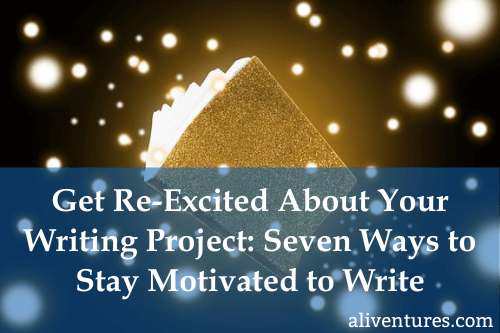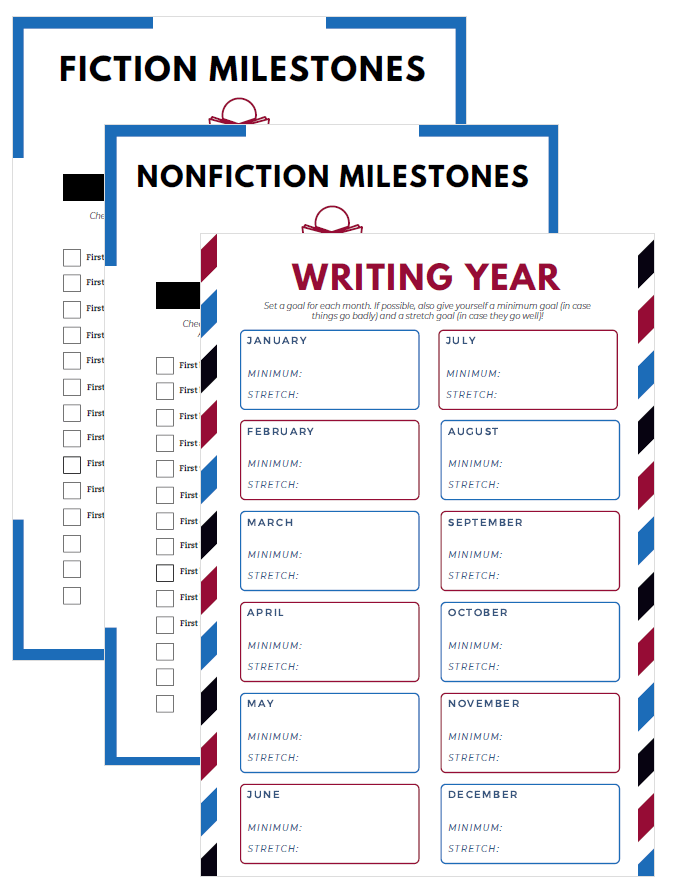Get Re-Excited About Your Writing Project: Seven Ways to Stay Motivated to Write

Motivation can be a huge struggle for writers. There are a lot of tips out there about getting motivated to write – but these tend to be focused on starting something new.
What if you’re part-way through a big project – say, you’ve written 20,000 words of a novel or 20 posts for a blog – but your enthusiasm is waning?
You might find that you can motivate yourself to write for a few days or weeks, but staying motivated to write may seem almost impossible.
This is a problem that crops up for a huge number of writers, often repeatedly. I’ve certainly been through it with multiple projects. In the recent Aliventures survey, one person asked about:
“Ways to keep motivated/to re-excite yourself about a project you are mid-way through, when the initial excitement of new ideas wears off?”
If you want to finally finish that novel, instead of adding it to the collection of “novel starts” that you’ve created, then here are some things you can try:
#1: Keep Up the Momentum on Your Project
Maybe you haven’t worked on your novel for a full month, or you haven’t written a new blog post in weeks. If so, it’s only natural that you’re struggling with staying motivated to write.
While I don’t think it’s necessary to write daily, I do think it’s important to write regularly. You’ll often find that just getting into motion – putting words down on the page again – helps you to feel more motivated.
I know that’s not much help when you’re struggling to feel at all enthusiastic about sitting down to write, but if you can just push yourself to do 10 – 15 minutes, you might find that you start to reconnect to your work.
Tip: If you’re finding it tough to squeeze writing time into your week, plan further ahead. Look at next week in your diary or calendar. Block out some time for writing, even if it’s just 30 minutes on a couple of different days.
#2: Find a New Angle That Interests You
If your project as a whole seems flat and uninteresting, is there something new you could add in? Perhaps one of your characters is boring: could you give them a hidden secret or an unexpected side to their character? Could you change something about them (e.g. making them older or younger, changing their gender) to make them more engaging and less conventional?
The wonderful thing about writing is that it’s incredibly easy to change direction. You haven’t paid for expensive materials for your work, in the way that a visual artist might. It doesn’t cost anything (except time and, perhaps, a bit of patience!) to delete words or to add new ones.
Tip: Struggling for a new angle? The Writing Jump Starts worksheet that comes with Supercharge Your Writing Session has a bunch of ideas you might like to try.
#3: Read About Writing – But Keep Writing Too!
Reading books, blog posts, magazines articles, or other material about writing can help you to stay motivated. You’ll learn things that directly help with your writing – like how to craft great dialogue. You might also come up with new ideas or things you want to try out.
But reading about writing serves a more subtle purpose, too. It helps embed you in the world of writing. It surrounds you with the thoughts and ideas of people who love writing and who believe that it matters … and that can be a huge help in staying motivated to write.
Tip: Reading about writing can help in so many ways – but only if you also make time to actually write. Don’t put off writing until you’ve finished yet another book, read up on yet another technique, or taken yet another course – make time for writing alongside learning.
#4: Keep Going Until the Midway Point
With big projects like novels and non-fiction books, I find that everything gets easier after I pass the 50% mark. If you can make it that far with your project, you’ll hopefully find that your momentum builds and it gets easier to keep writing
Plus, in terms of novel structure, the 50% point usually marks a significant turn. The protagonist stops reacting to events and instead begins to act. They take more control of their own destiny. Often, the novel will gather pace, building inexorably to the climax and resolution. This can certainly be a challenge to write – but it has its own energy, driving you forward as a writer.
Tip: Getting to the 50% point in a nonfiction piece will often also help with motivation. You’ll have the end in sight – plus you’ll have dealt with the (necessary but perhaps less interesting to write) introductory chapters.
#5: Stick with Drafting, not Rewriting or Editing
When you’re working on a big project, there might well be times when you go back to rewrite and edit a chapter before you’ve completed the whole of the first draft. For instance, you might be polishing up the first chapter of your novel so you can share it with your writing group.
In general, though, you’ll stay motivated best if you stick to drafting your book … not trying to rewrite it before it’s even finished. Simply getting to The End is hugely encouraging, even if you know you’re going to need to go back and make some significant changes.
Tip: You might well find that you get a few chapters into your novel or book only to realise that you want to change something. Just leave it as it currently is. Keep on writing as if you’d already made that change. That way, you can keep going forwards, sticking with the writing process.
#6: Take a Half Day or Full Day Writing Retreat
Many writers can only fit fairly short writing sessions into their week. Maybe you have 30 minutes or an hour most days when you can write – which is fantastic! – but you wish you had longer to immerse yourself in your writing.
If you want to rekindle your enthusiasm for writing, try taking a half day or even a full day writing retreat … and get away from home so you’re not distracted. My favourite way to do this is to book a hotel room overnight, usually from 2pm on a Friday until noon on a Saturday. That gives me a big chunk of time to focus on writing.
Even a full morning or afternoon at a coffee shop, local library, or a friend’s house can be hugely helpful. You may discover that all you needed to refind your motivation was to spend some time with your work-in-progress.
Tip: You’ll probably need to plan ahead to make this work. If, like me, you have kids, try 4 – 6 weeks ahead. That’s usually enough time to get everything else organised so you can actually take some time away.
#7: Cut Out or Reduce Other Commitments
It’s tough to stay motivated to write when life feels jam-packed. Perhaps you’ve got a hectic schedule or a lot of commitments at home, and these are constantly pressing in on your writing time. Maybe taking time out to write makes you feel guilty when there are so many other things you could be attending to.
Look for things in your life that you could cut out – or at least cut down on. Maybe you’re a member of a committee that you’d really rather leave, for instance, or you’re taking part in a lot of local groups. Perhaps you’re doing tons of work around the house and you could get your partner and/or kids to take on at least some of this.
Tip: If you struggle to say “no” to people, then get some support with this. It’s a really common problem but (as someone who also struggles!) it really is something you can get better at. I found Michael Hyatt’s advice on saying “no” really helpful – and there are loads of other blog posts (and whole books) on this subject too.
Important: Do You WANT to Finish Your Project?
Finally … it’s important to be open to the possibility that your lack of motivation means it’s time to move on from your project.
Maybe you started a novel three years ago, life got in the way, and you’re no longer feeling much connection to the character and situation that you’d come up with.
Or perhaps you launched a blog a year ago, wrote weekly for it, but you feel that you’ve run out of things to say.
This is a tricky judgement. Sometimes, pushing on and finishing a novel (or sticking with a blog) when you want to quit is the right decision. You’ll be (rightly!) proud of what you’ve accomplished – and you’ll have taught yourself to press on through self-doubt.
But sometimes, the reason you want to quit is because you’ve realised this isn’t the right project for you, at this stage in your life or writing career. Perhaps you no longer feel engaged by the idea – it was something that you were intrigued by a couple of years ago, but your interests have changed since then.
There’s no shame in quitting something that’s not working out for you. If you try some of the tips above but you still don’t feel at all motivated by your novel/blog/whatever you’re working on, then maybe it’s time to let it go so you can make room for a new big project instead.
But if you do still have that connection to your writing, then stick with it. Give yourself the time and opportunity to get enthusiastic about it again … and you’ll find yourself feeling more and more motivated to write.
Supercharge Your Writing Progress
If you want to make great, consistent progress with your writing, then check out the Supercharge Your Writing Progress pack.
It’s packed with tips (and printables) for staying on track with your writing over the months or even years.
Whether you’re trying to finish one big project or several smaller ones, it could be just what you need.
About

I’m Ali Luke, and I live in Leeds in the UK with my husband and two children.
Aliventures is where I help you master the art, craft and business of writing.
Start Here
If you're new, welcome! These posts are good ones to start with:
Can You Call Yourself a “Writer” if You’re Not Currently Writing?
The Three Stages of Editing (and Nine Handy Do-it-Yourself Tips)
My Novels

My contemporary fantasy trilogy is available from Amazon. The books follow on from one another, so read Lycopolis first.
You can buy them all from Amazon, or read them FREE in Kindle Unlimited.


0 Comments